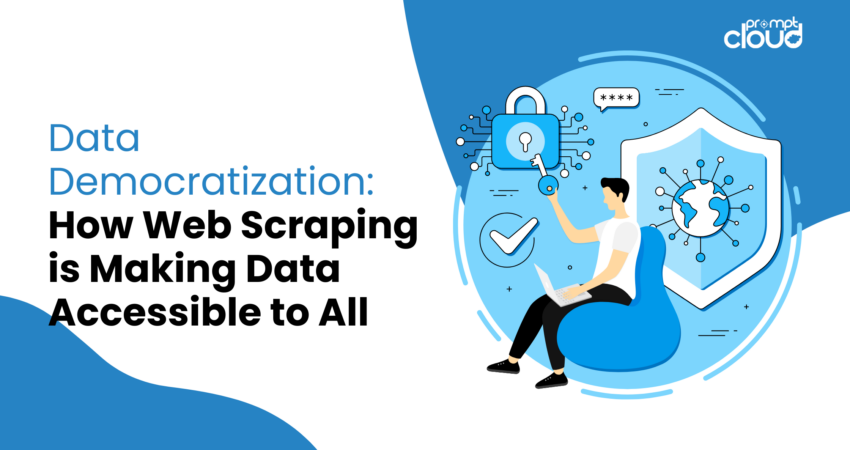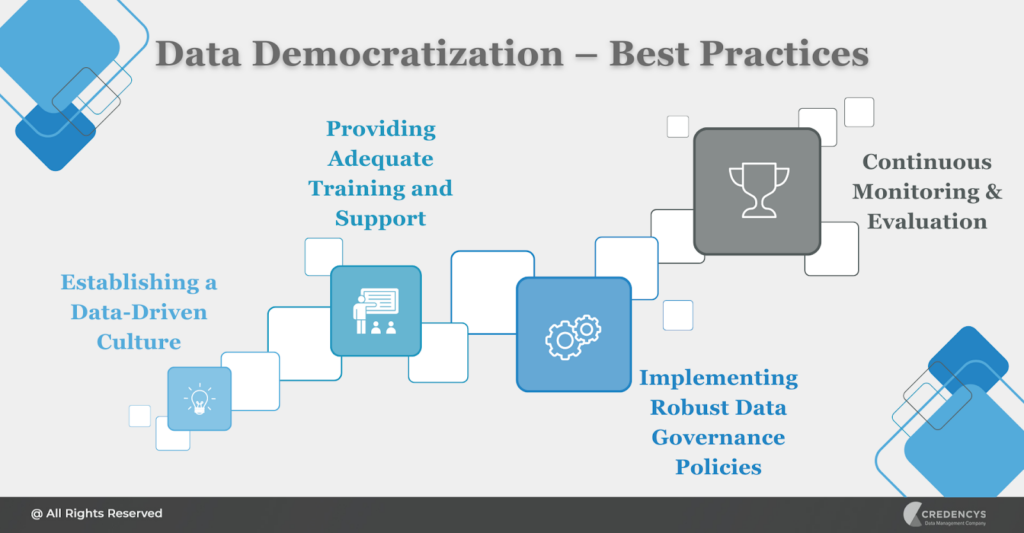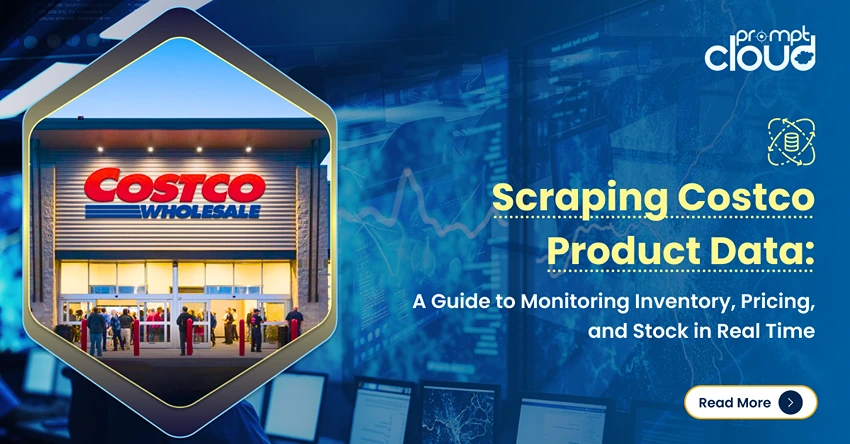
What is Data Democratization?
Data democratization refers to making data accessible to non-technical users across an organization. It aims to empower employees at all levels with the ability to access, understand, and utilize data in their decision-making processes.
This concept is pivotal in enabling businesses to become more agile, data-driven, and competitive in the market. Several key elements define data democratization:
- Access: Make data available to all employees, not just IT, by eliminating traditional restrictions.
- Understandability: Present data simply through visualizations, dashboards, and plain language reports.
- Usability: Offer user-friendly tools for non-technical staff to analyze and use data effectively.
- Security & Governance: Maintain strict data policies, including access control and monitoring, while encouraging open access.
The underlying principle of data democratization is providing more employees in a company access to data for informing decisions, leading to benefits such as enhanced operational efficiency, greater customer insight, and innovation in product development.

Image Source: https://blog.hubspot.com/
Technological advancements like business intelligence platforms, data visualization software, and machine learning algorithms have made it easier to analyze and understand data, democratizing both access to and insight from data.
Companies embarking on data democratization often face challenges such as resistance to change, data silos, and ensuring data quality. However, the benefits of creating a more inclusive data culture often outweigh these obstacles, leading to a more empowered and collaborative workforce.
Why is Data Democratization Important?
Modern businesses face complex challenges that necessitate the use of data to drive informed decision-making. Data accessibility is paramount, ensuring all levels of an organization benefit from comprehensive insights.
Democratizing data within organizations involves making data accessible to every employee, regardless of their technical expertise. Several key implications underscore its importance:
- Enhanced Decision-Making: Data democratization empowers employees to use data-driven insights in their daily decision-making processes.
- Increased Innovation: Access to data allows employees to identify trends and opportunities, fostering a culture of innovation.
- Operational Efficiency: When data is accessible throughout the organization, it eliminates bottlenecks and redundancies, leading to streamlined operations.
- Competitive Advantage: Businesses that leverage data more effectively can outpace competitors by rapidly responding to market changes.
- Employee Empowerment: Providing employees with data access fosters a sense of ownership and responsibility, boosting morale and productivity.

Moreover, data democratization necessitates a shift in organizational culture. Leadership must advocate for transparent data practices and encourage a data-driven mindset. By doing so, businesses remove silos and foster a collaborative environment that thrives on shared knowledge.
Data Democratization Benefits
Web scraping democratizes data, offering numerous benefits to companies:
- Competitive Advantage: Monitor competitors, trends, and consumer behavior; respond swiftly to market changes using real-time data.
- Improved Decision-Making: Make informed decisions based on accurate, up-to-date data; identify patterns, predict outcomes, optimize resource allocation.
- Cost Savings: Eliminate costly data services; reduce expenses associated with data acquisition.
- Innovation: Access varied datasets for innovative product development and research; explore new avenues unhindered by limited data.
- Market Insights: Understand consumers better; develop personalized marketing strategies and boost customer engagement.
- Efficient Operations: Automate data collection, streamline workflows, save time, and minimize manual efforts.
- Data Quality: Ensure consistent, structured, and clean data; enhance accuracy of analytical models.
- Collaboration: Foster collaboration and knowledge sharing among teams and organizations; promote growth and development.
Aligning data accessibility with business goals helps realize untapped opportunities and fuel significant growth. Embrace web scraping as an efficient method to democratize data and revolutionize your company’s operations in the digital age.
Data Democratization Challenges
Despite the potential and advantages of web scraping, democratizing data through this method encounters several challenges that must be addressed for effective application across all business sectors.
Legal & Ethical issues:
- Intellectual Property Rights violation may lead to lawsuits.
- Collecting PII without consent breaches privacy laws, causing fines and reputation loss.
Technical Difficulties:
- Website changes require frequent script updates.
- Anti-scraping tech like IP blocking, CAPTCHAs, and honey pot traps necessitate expert handling.
Data Quality Problems:
- Unstructured data needs extensive cleanup.
- Scraped data might not always be accurate or reliable.
High Resource Consumption:
- Requires considerable computational power and cost.
- Building, testing, and maintenance are labor-intensive and time-consuming.
Scalability Concerns:
- Handling massive amounts of data demands strong infrastructure.
- Bypassing API rate limits raises technical and ethical questions.
Infrastructure and Security Risks:
- Excessive scraping could overload web servers, resembling DDoS attacks.
- Poorly set up scrapers create security vulnerabilities, enabling data breaches and cyberattacks.
Addressing these challenges is crucial to harness the full potential of web scraping for democratizing data access safely and effectively.

Image Source: https://www.credencys.com/
Data Democratization Tool & Techniques
Data democratization involves making data accessible to everyone, irrespective of technical expertise. Various tools and techniques facilitate this aim within organizations, including web scraping services. The following outlines some essential tools and techniques used for data democratization.
Web Scraping Services
Web scraping services are integral for collecting data from websites. They allow businesses to automatically extract large volumes of data for analysis and decision-making. The use of web scraping services offers several advantages:
- Automated Data Collection: Simplifies and expedites the process of collecting data from multiple sources.
- Data Integration: Assists in merging data from various websites into a single, coherent dataset.
- Real-Time Data Access: Enables continuous access to up-to-date information, enhancing the relevance of insights.
Data Cleaning Tools
Data cleaning tools are crucial in ensuring that the data gathered is accurate and usable. These tools help in:
- Removing Duplicates: Ensures data uniqueness and accuracy.
- Correcting Errors: Identifies and rectifies inconsistencies and inaccuracies.
- Standardizing Data: Ensures data follows a consistent format, facilitating easier analysis.
Data Visualization Tools
Data visualization tools play a key role in translating raw data into comprehensible formats. They include features for:
- Interactive Dashboards: Allow users to manipulate data representations dynamically.
- Customizable Charts: Provide a variety of chart types (e.g., bar, line, pie) for different data sets.
- Real-Time Analytics: Offer insights through live data tracking.
Collaborative Platforms
Facilitating collaboration and data sharing within teams is essential. Collaborative platforms offer:
- Shared Workspaces: Enable real-time collaboration and data sharing among team members.
- Version Control: Maintains historical data versions and tracks changes.
- Project Management Features: Help in coordinating tasks and deadlines related to data projects.
Machine Learning & AI Tools
Machine learning and AI tools are increasingly employed to derive insights from data. Their capabilities include:
- Predictive Analytics: Forecasts trends and patterns based on historical data.
- Anomaly Detection: Identifies outliers and irregularities in datasets.
- Natural Language Processing (NLP): Extracts meaningful information from text-based data.
Using these tools and techniques, businesses can ensure that data is accessible, clean, visualized, collaborative, and insightful. This democratization of data empowers members at all levels of an organization to make data-driven decisions effectively.
Conclusion
Data democratization via web scraping is reshaping business futures, providing accessible data analysis for all. It expands access to diverse public info, enabling data-driven decisions for companies of any size. Advancements in web scraping tech will further increase extractable data types and utilization methods.
This shift towards broadened data access promotes informed decision-making and industry innovation, revolutionizing business operations and competition in the marketplace, leading to an era of enhanced data-driven excellence.Businesses aspiring to unlock the power of web scraping for data democratization can greatly benefit from PromptCloud’s customized web scraping services. By choosing PromptCloud for web scraping needs, businesses can focus on analyzing and utilizing data rather than worrying about the complexities of data extraction. Schedule your free demo or reach out to us at sales@promptcloud.com.



















